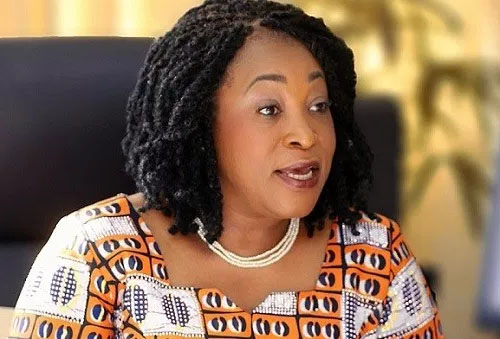Shirley Ayorkor Botchwey – Foreign Minister
AFRICAN FOREIGN Ministers attending the Forum for China-Africa Cooperation (FOCAC) Coordinators’ meeting in Beijing yesterday met Chinese financial institutions who introduced them to their array of financial products.
In all, eight banks met the Foreign Ministers including Ghana’s Shirley Ayorkor Botchwey to brief them on how they could participate in the various development programmes in their home countries and also, areas China already had investments in Africa.
This is in line with Chinese President, Xi Jinping’s $60 billion pledge in financial support to African countries announced in Johannesburg, South Africa in 2015 during the FOCAC Leaders summit. This was repeated in Beijing at the 2018 summit which was attended by President Akufo-Addo.
The breakdown showed that $5 billion was free aid and interest-free loans, while $35 billion was for preferential loans and export credit on more favourable terms, and five billion dollars for additional capital for the China Africa development fund. Five billion dollars was also up for initial capital of special loans for the development of African small to medium enterprises each, and $10 billion for China-Africa production capacity cooperation fund.
Ahead of the meeting with the bank executives, the foreign ministers met the Chinese Vice President, Wang Qishan at the Great Hall and had a photo session after which they had a closed door meeting.
The banks included China Development Bank, Export-Import Bank of China (China Exim), Agriculture Bank of China, Bank of China, China Construction Bank, Silk Road Fund, an equity fund, China-Africa Development Fund and China-Africa Fund for Industrial Cooperation.
The financial institutions all took time to brief the ministers of their current projects in Africa in line with FOCAC’s framework of industrial development with an aim to creating jobs.
According to Liu Yong, Chief Economist of China Development Bank, the Chinese government was committed to ensuring that all the parties benefitted in the FOCAC initiatives.
He said African countries and China had their destinies tied together and that the new partnership would promote a win-win situation for the continent.
He conceded that Africa had strong fundamentals that China could tap into with the Chinese focusing on infrastructure development using the capital of the financial institutions.
Chairman for FOCAC African Coordinators and Senegalese Foreign Minister, Amadou Ba, said Africa should not solely rely on Chinese magnanimity but show innovations in resource management in order to reduce the debt burden.
He said the $60 billion Chinese development facility should not saddle the continent with additional debt burden but rather be a catalyst for economic development.
“We should strengthen our business environment because Africa is a promising continent with key potential”, Mr Ba indicated.
Infrastructure
The banks took the ministers through the projects they were currently undertaking on the continent with most of them concentrated in East, Central and Southern Africa with little to talk about in Ghana.
According to reports, China has completed or started 194 infrastructure projects in transport, power generation and telecommunications under the framework of FOCAC.
Some of the projects are railway lines linking some countries in East Africa, energy, aviation and industrial establishment.
Twenty industrial cooperation zones have been set up in 15 African countries with a combined investment of $5.38 billion.
Some of these industrial cooperation zones are the China-Egypt Suez Economic and Trade Cooperation Zone; Ethiopia Oriental Industrial Park; Zambia-China Economic and Trade Cooperation Zone and Nigeria Lekki Free Trade Area among others.
About 435 enterprises have so far invested in these industrial parks with a total output of $19.35 billion, paying taxes of $1.62 billion and creating 33,534 jobs in the various countries.
Already completed projects included Ethiopia’s first electrified railway linking its capital Addis Ababa and Djibouti launched in October 2016; the launch in June 2017 of the first phase of the Mombasa–Nairobi Standard Gauge Railway Project, which is the largest infrastructure project undertaken by Kenya since independence.
Other key projects are the Ethiopia Rail-Road College project, China-Africa Aviation College in Mauritius, Transport University in Tanzania, Railway College in Kenya, Aviation College in Republic of Congo, Zimbabwe’s Victoria Falls International Airport, completion of new terminal of Simbel-Eyadema international airport in Lome, Togo and construction of the Nyerere Bridge in Tanzania.
From Fortune Alimi, Beijing, China


